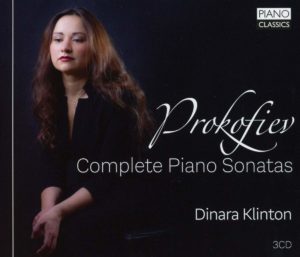For years Dinara Klinton was a denizen of the international competition circuit, frequently figuring among the top prize winners. Her solid technique and genuine artistry serve Prokofiev’s cycle of piano sonatas well, largely because she treats these works as music, rather than gymnastics.
Take the ubiquitous Seventh sonata, for example: Instead of brainlessly speeding through the finale as many young contenders tend to do, Klinton takes the time to allow the composer’s cross-rhythmic interplay and inner melodies to register. She voices the Sixth sonata second movement’s steady detached chords with a keen ear for voicing and balancing, as if she were orchestrating the piano writing to be played by a finely honed woodwind ensemble. Perhaps her basic tempo for No. 8’s long final movement is a bit sedate and soft-grained, yet you cannot dispute Klinton’s intelligent scaling of dynamics and climaxes.
If some listeners might prefer more explosive momentum in the single-movement First and Third sonatas or more bristle and bravura from No. 2’s fourth movement, Klinton’s slower tempo imparts greater lilt and shape to the latter’s motoric right-hand triplets. Klinton’s low-lying repeated chords in No. 4’s second movement groan instead of bang, while her innate sensitivity flourishes in the lyrical movements of Nos. 5 and 9.
Klinton’s Prokofiev cycle won’t displace my Matti Raekallio, Yefim Bronfman, Anne-Marie McDermott, and Frederic Chiu references, but I’m more than happy to make shelf space for such unpressured and genuinely musical interpretations as hers. Worth hearing.
































